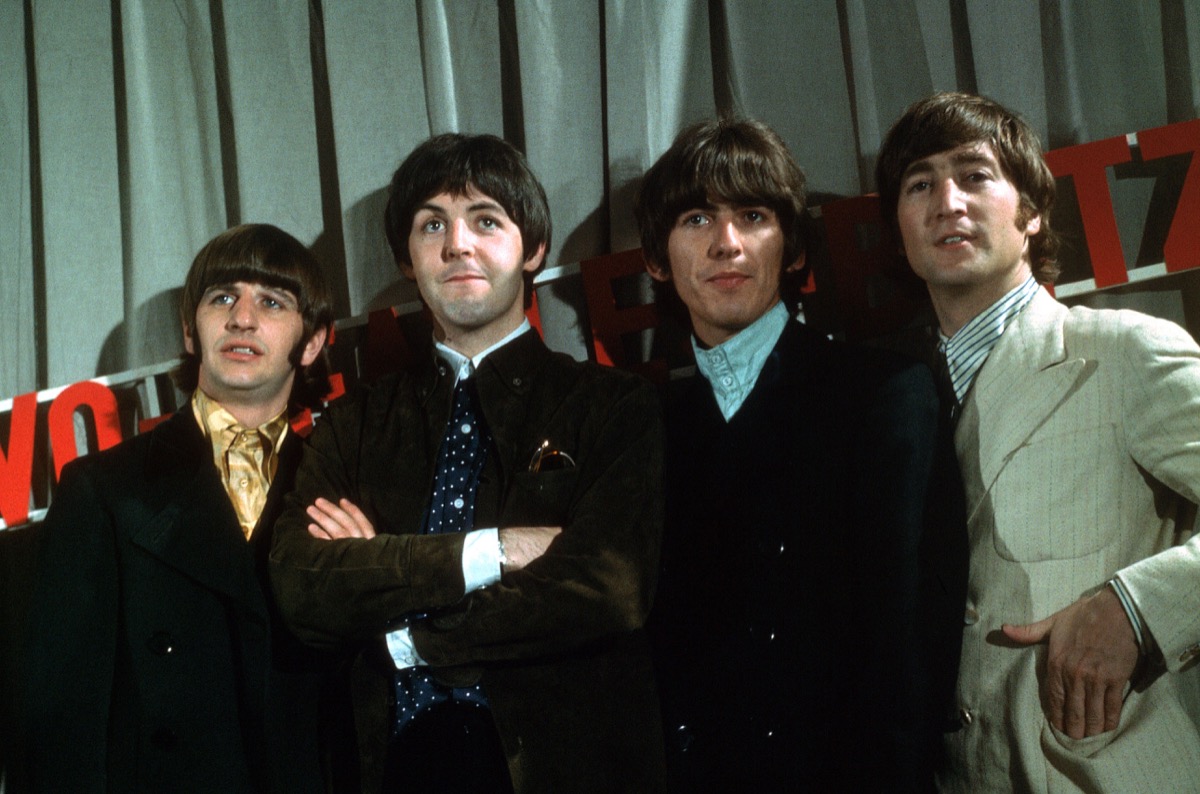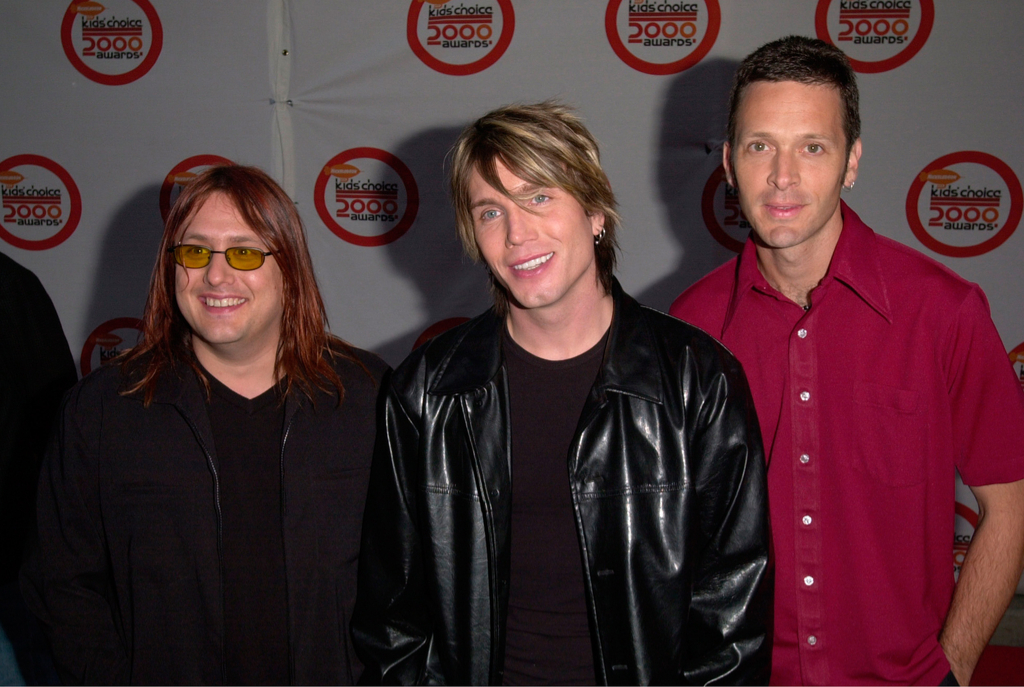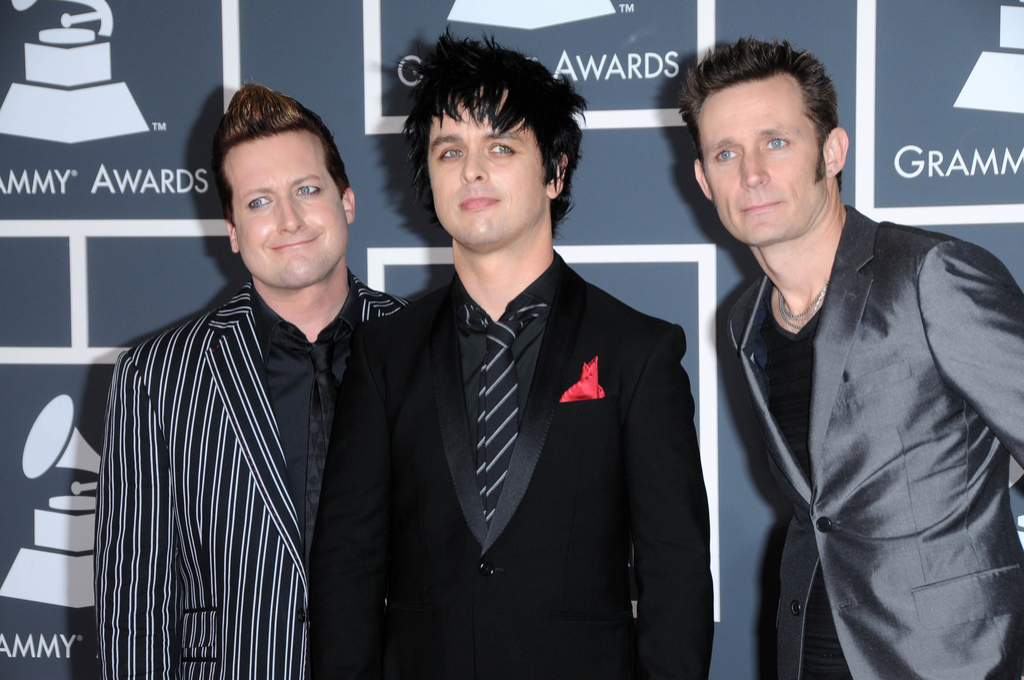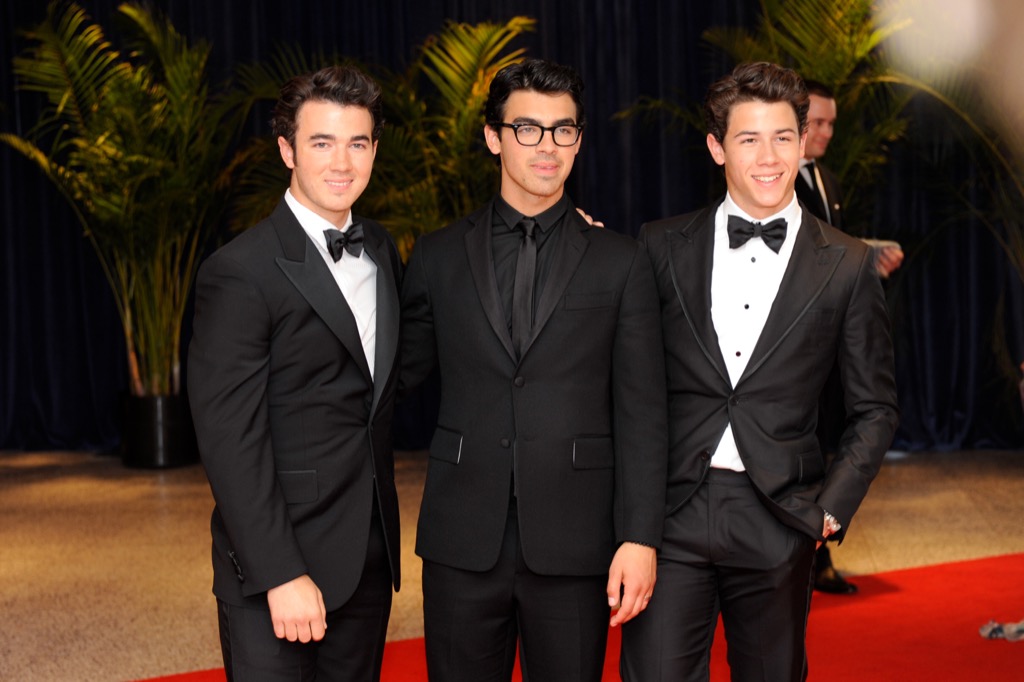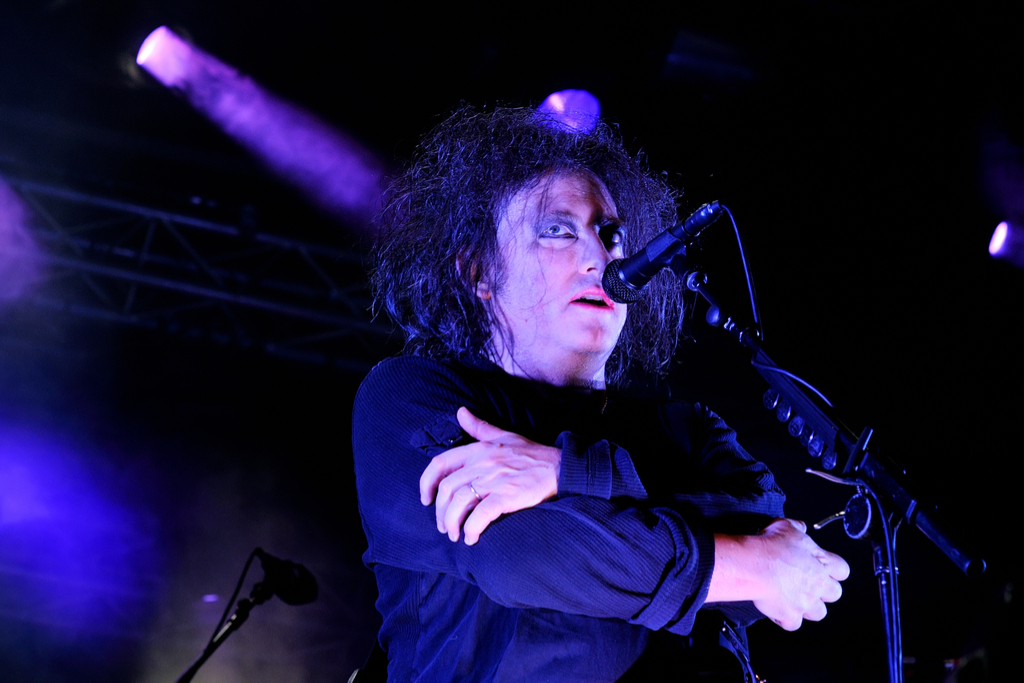Even though the first letter of each word in the song title spells out “LSD,” John Lennon repeatedly denied claims that The Beatles’ 1967 hit “Lucy in the Sky with Diamonds” was about any questionable recreational activities. Decades later, Paul McCartney set the story straight in a 2004 interview with Uncut magazine. “‘Lucy in the Sky,’ that’s pretty obvious,” he said. “There’s others that make subtle hints about drugs, but, you know, it’s easy to overestimate the influence of drugs on the Beatles’ music.” And for more Beatles stories that are not exactly fact, here are 50 Totally Absurd Celeb Rumors That Some People Really Believe Song composer Jim Steinman revealed that Bonnie Tyler’s hit 1993 song “Total Eclipse of the Heart” was originally titled “Vampires in Love.” “If anyone listens to the lyrics, they’re really like vampire lines. It’s all about the darkness, the power of darkness and love’s place in dark,” the composer told Playbill in 2002. So, the next time you listen to this 1990s classic, imagine it being about two vampires necking. And if you’re a child of the ’90s, you’ll remember these 25 Songs Every ’90s Kid Knows By Heart. Reggae icon Bob Marley was incredibly adept at weaving rather complicated storylines into his music. Take his 1973 song “I Shot the Sheriff,” for example. According to Marley’s ex lover, the song actually details his desire for her not to take birth control pills, something he allegedly believed to be sacrilegious. The song’s meaning was laid out in the 2011 film Bob Marley: The Making of a Legend, according to the Miami New Times. Marley’s ex says “the sheriff” was the doctor who prescribed her the pills.ae0fcc31ae342fd3a1346ebb1f342fcb When you reexamine the lyrics (like “Every time I plant a seed/He said kill it before it grow”), it seems to make sense. And though Marley never confirmed the meaning himself, he did say in 1974, “That’s not really a sheriff—it’s the elements of wickedness.” And for another artist who made this song famous, check out The 50 Best Cover Songs of All Time. Lady Gaga’s early hits often explored her bisexuality. In some, it was openly discussed, like in “So Happy I Could Die” where she talks about falling for a “lavender blonde.” But other times, it was so subtle you could miss it. And that was the case with 2008’s “Poker Face.” Gaga opened up about the real meaning of the song in 2009, when she said during a performance that “Poker Face” is about being in a relationship with a man while fantasizing about being with a woman, according to NBC. Contrary to popular belief, this steamy love song that appeared on Maroon 5’s debut album, Songs About Jane, was actually not detailing lead singer Adam Levine’s love life. In fact, “Harder to Breathe” was actually inspired by pressure from the band’s record label when it came to the 2002 album. “That song comes sheerly from wanting to throw something. It was the 11th hour, and the label wanted more songs. It was the last crack,” Levine told MTV in 2002. “I wanted to make a record and the label was applying a lot of pressure, but I’m glad they did.” When Sia released her song “Chandelier” in 2014, it was widely interpreted as a party song. But the artist intended it to be just the opposite. She actually penned the song about her past struggles with addiction and alcoholism, which she dealt with after her boyfriend was fatally hit by a taxi in 1997. Sia turned to drugs and alcohol to cope, but eventually got into Alcoholics Anonymous and is now sober. “That’s why ‘Chandelier’ was interesting to me,” Sia told NPR in 2014. “I wrote the song because there’s so many party-girl anthems in pop. And I thought it’d be interesting to do a different take on that.” And while we’re talking about the singer, did know Sia’s last name was Furler? To learn more, check out 50 Celebrities Whose Real Names You Never Knew. Phil Collins’ first solo single after leaving Genesis, “In the Air Tonight,” contains a disturbing monologue about what sounds like the singer’s brush with a man who refused to save someone who was drowning. But Collins revealed his first big hit is actually about something else entirely. In an interview with the BBC, Collins confessed that the 1981 song is an introspective look at his divorce from his first wife. “It’s obviously in anger. It’s the angry side, or the bitter side of a separation,” he said. “What makes it even more comical is when I hear these stories which started many years ago, particularly in America, of someone coming up to me and saying, ‘Did you really see someone drowning?’ I said, ‘No, wrong.’” Since its release in 1998, many believed that this popular song by the Goo Goo Dolls is a love story. But in a 2002 episode of VH1’s Storytellers, lead singer Johnny Rzeznik revealed the song’s true meaning—and it’s much darker than anyone had anticipated. The lead singer said “Slide” is about “these two teenage kids, and the girlfriend gets pregnant, and they’re trying to decide…whether she should get an abortion or whether they should get married…and I don’t think a lot of people got that.” The song’s secret meaning actually seems pretty clear when you look at lyrics like, “Don’t you love the life you killed?/The priest is on the phone/Your father hit the wall/Your ma disowned you.” And we bet you also didn’t know that “Goo Goo Dolls” isn’t this band’s original name. Want to know more? Check out 30 Terrible Original Names for Your Favorite Bands. “Firework” by Katy Perry has been a motivational anthem since it was released in 2010. But according to the pop star, what inspired it was actually her own inevitable death. “Basically, I have this very morbid idea,” Perry told Billboard in 2010. “When I pass, I want to be put into a firework and shot across the sky over the Santa Barbara Ocean as my last hurrah.” Perry added that she liked the fact that fireworks make crowds “ooh” and “ahh.” “I guess that making people go ‘ahhh’ is kind of like my motto,” she said. If you’ve attended a graduation ceremony, funeral, wedding, or goodbye party in the last 20 years, it’s highly likely that you’ve heard “Good Riddance (Time of Your Life)” by Green Day a few times. The 1997 song has been widely interpreted to be about moving on to the next chapter of one’s life. But in 2006, the band’s lead singer, Billie Joe Armstrong, confessed to Guitar World that the song was actually penned when he was feeling incredibly angry and resentful over a breakup with an ex-girlfriend who was moving to Ecuador. “In the song, I tried to be level-headed about her leaving, even though I was completely p***** off,” Armstrong said. “So I named it ‘Good Riddance’ just to express my anger.” And for more songs about heartbreak, check out The 100 Best Breakup Songs of All Time. Contrary to popular belief, singer-songwriter Sara Bareilles is not telling a clingy boyfriend to get off her back in her 2007 hit “Love Song.” In reality, similar to the case with Maroon 5’s “Harder to Breathe,” Bareilles wrote this song for record label execs, who were demanding that she write a romantic tune that she didn’t have in her. “They had encouraged me to keep writing, and I just wasn’t having any luck, and I was turning in the beginnings of ideas and snippets of moments of a song, and I was just getting a really sort of blasé reaction to everything,” she told MTV in 2008. “It’s totally honest, and I’m very lucky the label liked it as well.” This seemingly simple 1998 song about a bar closing after a long night of merrymaking is actually, at its core, something much more. During a 2008 performance, a decade after the Semisonic song first came out, lead singer Dan Wilson finally said “Closing Time” was actually about his impending fatherhood. Looking back, the lyric “Closing time/This room won’t be open ’til your brothers or your sisters come” must refer to his wife’s womb. Here’s another hit song from the ’90s that has a much deeper message within its seemingly surface-level lyrics. Shortly after “Semi-Charmed Life” was released, Third Eye Blind frontman Stephan Jenkins explained in a 1997 interview with Billboard that it’s “a dirty, filthy song” about a drug-fueled bender. “It really is funny that people play it on the radio,” Jenkins said. “I think people hear ‘Semi-Charmed Life’ as a happy summertime jam. And that’s fine with me,” he added. It may seem like this first hit single from Lorde was about how she would never live up to the riches and fame of a monarchy. But the songstress admitted in an interview with VH1 that her 2013 song “Royals” was actually inspired by a photo of Kansas City Royals baseball player George Brett being hounded for autographs by fans. “I’d been kind of thinking about writing that song for a while and been pulling together a couple little lines here and there, and I had this image from the National Geographic of this dude signing baseballs,” the New Zealand singer explained in 2013. “He was a baseball player and his shirt said Royals. I was like, ‘I really like that word,’ because I’m a big word fetishist. I’ll pick a word and I’ll pin an idea to that.” The following year, Lorde met Brett and they posed for a photo together. So, it’s safe to say she’s basically a royal now. At the height of their popularity in 2008, the Jonas Brothers released a song called “A Little Bit Longer,” which sounded like a breakup song. But Nick Jonas told MTV that the song was actually about his struggle with type 1 diabetes. “I had a day when my sugar was out of range, and I sat down at the piano and wrote it in 20 minutes. And it was because I had this strong inspiration,” he told MTV shortly after the song came out. When you reexamine certain lyrics (like “Waiting on a cure/But none of them are sure”), the meaning seems clear in hindsight. Many of The Weeknd’s fans initially believed that his first hit song, 2015’s “I Can’t Feel My Face,” was about the euphoria of being in an exciting new relationship. But he was actually using his songwriting prowess to personify his past drug abuse, according to Billboard. In a New York Times profile, The Weeknd revealed that as a teenager, he would “get high on whatever was around.” With several lyrics detailing how “she’ll be the death of me,” it seems clear that “I Can’t Feel My Face” is about substance abuse. Nearly every time Selena Gomez puts out a new single, her army of fans (AKA Selenators) are at the ready to decipher all of its hidden messages. In the case of 2017’s “Wolves,” they figured out early on that the upbeat pop song is most likely about Gomez’s struggle with lupus. After all, the Latin word “lupus” directly translates to “wolf.” Though the singer hasn’t been explicit about the song’s meaning, Gomez told Beats 1 that “the song is very beautiful and personal and the lyrics just have a whole story of its own. Weirdly, at the same time I was working on it in Japan, I was going through stuff, too, so it’s mirrored everything.” The Cure’s lead singer Robert Smith is known for spinning rather esoteric poetry into chart-topping hits. Case in point, 1987’s “Just Like Heaven,” a seemingly innocent song about falling in love. “It’s another one of those lyrics that just kind of seeps in,” Gourley told Genius. “With all the talk right now, of building a wall at our borders and the Berlin Wall, it was so much just like the image that you had in your head growing up that these people are separated by a wall, and why do we need that?” However, as Smith pointed out in a 2003 interview with Blender, the famous line “Just what is this scream/laugh/hug inducing trick?” is actually inspired by an instance in which he was hyperventilating and began “fainting to the floor.” Smith told Blender: “As the song progressed, I introduced some different chord changes, which give it that slightly melancholic feeling.” “Higher,” the 1999 lead single off Creed’s second studio album, seemed like a simple Christian rock ballad about a higher power. But lead singer Scott Stapp said that the hit that inevitably helped Creed reach meteoric success was actually about the benefits of lucid dreaming. In 2000, Stapp told Spin magazine he’d been having a recurring nightmare and delved into the practice of lucid dreaming to rid himself of it. And that’s what “Higher” is about.
